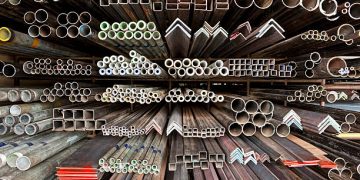Aluminium and nickel prices experienced significant increases following sanctions imposed on Russian supply by the UK and US governments. The sanctions effectively prohibit the trading of new Russian supplies of these crucial industrial metals on two major global exchanges.
Aluminium, which finds application in various sectors including aviation and construction, saw a surge of up to 9.4% on Monday, marking its largest intraday rise since its current contract inception 37 years ago. Subsequently, it settled to trade 2.8% higher at $2,562 per tonne. Nickel, vital for electric vehicle batteries and steel production, also saw an increase of 1.5%.
The implementation of sanctions occurred after both the British and US administrations banned the delivery of new Russian supplies to the London Metal Exchange and the Chicago Mercantile Exchange. Copper, the third metal affected by these measures, rose by 1.6% to $9,604 per tonne, reaching its highest level in 22 months, as a tighter market is anticipated due to the sanctions.
Russia plays a significant role as a producer of these metals, accounting for 6% of global aluminium, 4% of copper, and 11% of high-purity nickel metal, according to Citigroup.
In response to the sanctions, the London Metal Exchange announced that Russian metal produced after April 13 would not be allowed in its warehouses. However, Russian metal produced before this date can still enter the LME warehouse system under a separate category.
The recent sanctions come amid ongoing concerns regarding the accumulation of Russian supplies in metal marketplaces, particularly on the London Metal Exchange. The dominance of Russian-origin metal in LME inventories, exceeding 90% for aluminium, raised apprehensions about the accuracy of price benchmarks.
Analysts suggest that the sanctions are likely to elevate prices of exchange-traded metals and amplify the discount for newly produced Russian metal. They anticipate that Russian companies may attempt to move metals produced before April 13 into LME warehouses or engage in bilateral deals independently of metal exchanges.
Rusal, Russia’s largest aluminium producer, stated that the sanctions would not hinder its ability to sell its output, asserting that there remains a significant global demand for Russian metal. Analysts speculate that countries such as China, India, and Turkey could absorb any Russian metal that western consumers might avoid due to the restrictions imposed by the US and UK.
Stay updated with supply chain news at The Supply Chain Report. Learn more about international trade at ADAMftd.com with free tools.
#RussianSanctions #MetalMarketSurge #AluminumPriceHike #NickelDemand #GlobalTradeTensions #CommodityMarketImpact
















